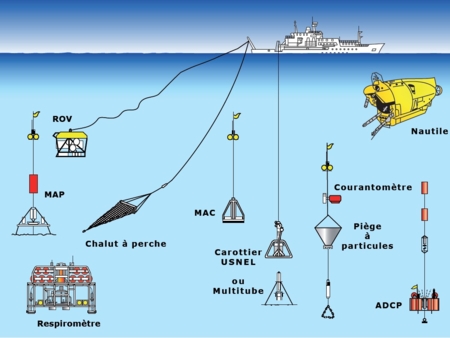Persephonella atlantica sp. nov.: How to adapt to physico-chemical gradients in high temperature hydrothermal habitats
Published in Systematic And Applied Microbiology
François D., Godfroy A., Mathien C., Aubé J., Cathalot C., Lesongeur F., L'Haridon Stephane, Philippon X., Roussel E. G. (2021). Persephonella atlantica sp. nov.: How to adapt to physico-chemical gradients in high temperature hydrothermal habitats .
A novel thermophilic, microaerophilic and anaerobic, hydrogen- sulphur- and thiosulphate-oxidising bacterium, designated MO1340T, was isolated from a deep-sea hydrothermal chimney collected from the Lucky Strike hydrothermal vent field on the Mid-Atlantic Ridge. Cells were short, motile rods of 1.4–2.2 μm length and 0.5–0.8 μm width. Optimal growth was observed for a NaCl concentration of 2.5 % (w/v) at pH 6.5. As for other members of the genus Persephonella, strain MO1340T was strictly chemolithoautotrophic and could oxidise hydrogen, elemental sulphur or thiosulphate using oxygen as electron acceptor. Anaerobic nitrate reduction using hydrogen could also be performed. Each catabolic reaction had a different optimal growth temperature (65 to 75 °C) and an optimal dissolved oxygen concentration (11.4 to 119.7 μM at 70 °C for aerobic reactions) that varied according to the electron donors utilised. These experimental results are consistent with the distribution of these catabolic substrates along the temperature gradient observed in active hydrothermal systems. They strongly suggest that this adaptive strategy could confer a selective advantage for strain MO1340T in the dynamic part of the ecosystem where hot, reduced hydrothermal fluid mixes with cold, oxygenated seawater. Phylogenetic analysis indicated that strain MO1340T was a member of the genus Persephonella within the order Hydrogenothermales as it shared a 16S rRNA gene sequence similarity <95.5 % and ANI respectively 75.66 % with closest described Persephonella (P. hydrogeniphila 29WT). On the basis of the physiological and genomic properties of the new isolate, the name Persephonella atlantica sp. nov. is proposed. The type strain is MO1340T (=UBOCC-M-3359T =JCM 34026T).







